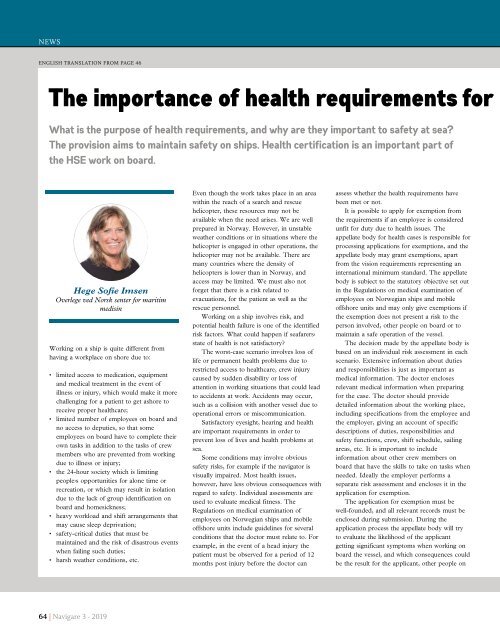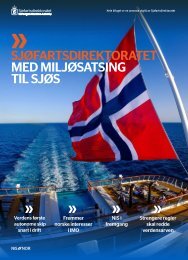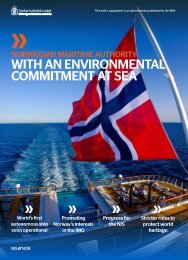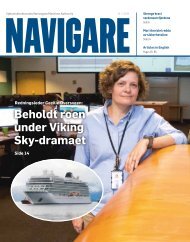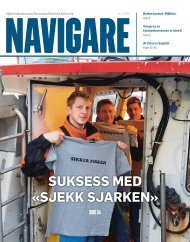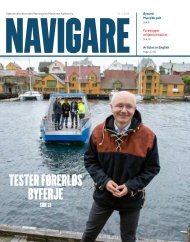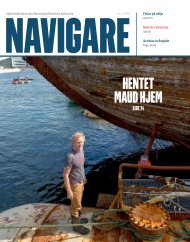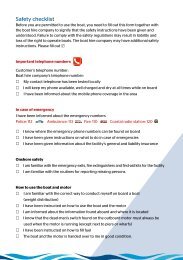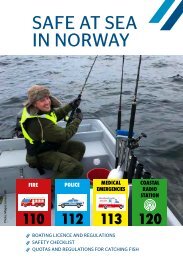Navigare 3 - 2019
Create successful ePaper yourself
Turn your PDF publications into a flip-book with our unique Google optimized e-Paper software.
news<br />
english translation from page 46<br />
The importance of health requirements for<br />
What is the purpose of health requirements, and why are they important to safety at sea?<br />
The provision aims to maintain safety on ships. Health certification is an important part of<br />
the HSE work on board.<br />
Hege Sofie Imsen<br />
Overlege ved Norsk senter for maritim<br />
medisin<br />
Working on a ship is quite different from<br />
having a workplace on shore due to:<br />
• limited access to medication, equipment<br />
and medical treatment in the event of<br />
illness or injury, which would make it more<br />
challenging for a patient to get ashore to<br />
receive proper healthcare;<br />
• limited number of employees on board and<br />
no access to deputies, so that some<br />
employees on board have to complete their<br />
own tasks in addition to the tasks of crew<br />
members who are prevented from working<br />
due to illness or injury;<br />
• the 24-hour society which is limiting<br />
people›s opportunities for alone time or<br />
recreation, or which may result in isolation<br />
due to the lack of group identification on<br />
board and homesickness;<br />
• heavy workload and shift arrangements that<br />
may cause sleep deprivation;<br />
• safety-critical duties that must be<br />
maintained and the risk of disastrous events<br />
when failing such duties;<br />
• harsh weather conditions, etc.<br />
Even though the work takes place in an area<br />
within the reach of a search and rescue<br />
helicopter, these resources may not be<br />
available when the need arises. We are well<br />
prepared in Norway. However, in unstable<br />
weather conditions or in situations where the<br />
helicopter is engaged in other operations, the<br />
helicopter may not be available. There are<br />
many countries where the density of<br />
helicopters is lower than in Norway, and<br />
access may be limited. We must also not<br />
forget that there is a risk related to<br />
evacuations, for the patient as well as the<br />
rescue personnel.<br />
Working on a ship involves risk, and<br />
potential health failure is one of the identified<br />
risk factors. What could happen if seafarers›<br />
state of health is not satisfactory?<br />
The worst-case scenario involves loss of<br />
life or permanent health problems due to<br />
restricted access to healthcare, crew injury<br />
caused by sudden disability or loss of<br />
attention in working situations that could lead<br />
to accidents at work. Accidents may occur,<br />
such as a collision with another vessel due to<br />
operational errors or miscommunication.<br />
Satisfactory eyesight, hearing and health<br />
are important requirements in order to<br />
prevent loss of lives and health problems at<br />
sea.<br />
Some conditions may involve obvious<br />
safety risks, for example if the navigator is<br />
visually impaired. Most health issues,<br />
however, have less obvious consequences with<br />
regard to safety. Individual assessments are<br />
used to evaluate medical fitness. The<br />
Regulations on medical examination of<br />
employees on Norwegian ships and mobile<br />
offshore units include guidelines for several<br />
conditions that the doctor must relate to. For<br />
example, in the event of a head injury the<br />
patient must be observed for a period of 12<br />
months post injury before the doctor can<br />
assess whether the health requirements have<br />
been met or not.<br />
It is possible to apply for exemption from<br />
the requirements if an employee is considered<br />
unfit for duty due to health issues. The<br />
appellate body for health cases is responsible for<br />
processing applications for exemptions, and the<br />
appellate body may grant exemptions, apart<br />
from the vision requirements representing an<br />
international minimum standard. The appellate<br />
body is subject to the statutory objective set out<br />
in the Regulations on medical examination of<br />
employees on Norwegian ships and mobile<br />
offshore units and may only give exemptions if<br />
the exemption does not present a risk to the<br />
person involved, other people on board or to<br />
maintain a safe operation of the vessel.<br />
The decision made by the appellate body is<br />
based on an individual risk assessment in each<br />
scenario. Extensive information about duties<br />
and responsibilities is just as important as<br />
medical information. The doctor encloses<br />
relevant medical information when preparing<br />
for the case. The doctor should provide<br />
detailed information about the working place,<br />
including specifications from the employee and<br />
the employer, giving an account of specific<br />
descriptions of duties, responsibilities and<br />
safety functions, crew, shift schedule, sailing<br />
areas, etc. It is important to include<br />
information about other crew members on<br />
board that have the skills to take on tasks when<br />
needed. Ideally the employer performs a<br />
separate risk assessment and encloses it in the<br />
application for exemption.<br />
The application for exemption must be<br />
well-founded, and all relevant records must be<br />
enclosed during submission. During the<br />
application process the appellate body will try<br />
to evaluate the likelihood of the applicant<br />
getting significant symptoms when working on<br />
board the vessel, and which consequences could<br />
be the result for the applicant, other people on<br />
64 | <strong>Navigare</strong> 3 - <strong>2019</strong>


